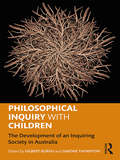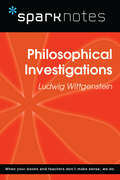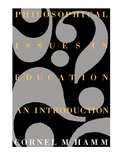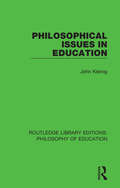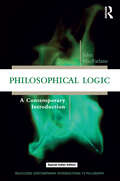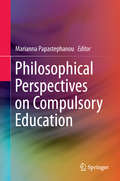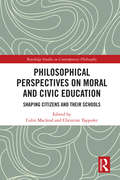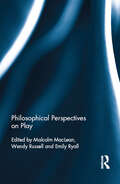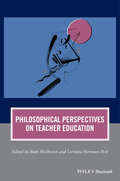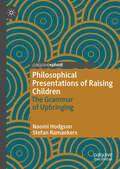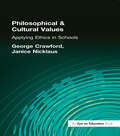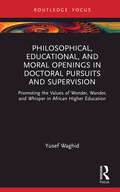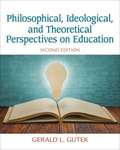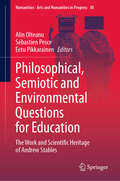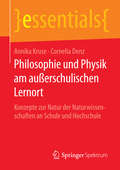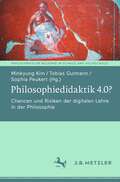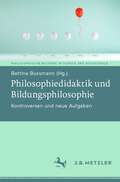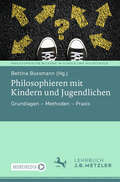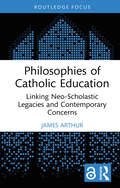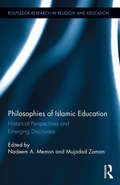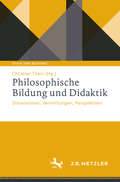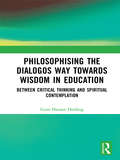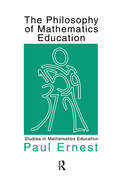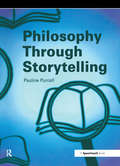- Table View
- List View
Philosophical Inquiry with Children: The Development of an Inquiring Society in Australia
by Gilbert Burgh Simone ThorntonPhilosophy in schools in Australia dates back to the 1980s and is rooted in the Philosophy for Children curriculum and pedagogy. Seeing potential for educational change, Australian advocates were quick to develop new classroom resources and innovative programs that have proved influential in educational practice throughout Australia and internationally. Behind their contributions lie key philosophical and educational discussions and controversies which have shaped attempts to introduce philosophy in schools and embed it in state and national curricula. Drawing together a wide range of eminent scholars and practitioners in the field of educational philosophy, this anthology, the first of its kind, provides not only a historical narrative, but an opportunity to reflect on the insights and experiences of the authors that have made history. The collection is divided into three parts. The overarching theme of Part I is the early years of Philosophy for Children in Australia and how they informed the course that the ‘philosophy in schools movement’ would take. Part II focuses on the events and debates surrounding the development and production of new materials, including arguments for and against the suitability of the original Philosophy for Children curriculum. In Part III, key developments relating to teaching philosophy in schools are analysed. This collection of diverse views, critical appraisals, and different perspectives of historical currents is intended to stimulate thought-provoking questions about theory and practice, and to increase general awareness both nationally and internationally of the maturation of philosophy in schools in Australia. It is also intended to encourage readers to identify emerging ideas and develop strategies for their implementation.
Philosophical Investigations (SparkNotes Philosophy Guide)
by SparkNotesPhilosophical Investigations (SparkNotes Philosophy Guide) Making the reading experience fun! SparkNotes Philosophy Guides are one-stop guides to the great works of philosophy–masterpieces that stand at the foundations of Western thought. Inside each Philosophy Guide you&’ll find insightful overviews of great philosophical works of the Western world.
Philosophical Issues In Education: An Introduction
by Cornel M. HammFirst published in 1989. Routledge is an imprint of Taylor & Francis, an informa company.
Philosophical Issues in Education (Routledge Library Editions: Philosophy of Education #11)
by John KleinigThe philosophy of education is an important component of most education courses. The subject is often split into two traditions, one emphasising the use of analytic philosophy, the other engaging in radical social criticism. This book, first published in 1982, brings together the strengths of both traditions and takes stock of the debate. This study provides an interesting introduction to all the major philosophical issues in education which is different to many other works on the subject.
Philosophical Logic: A Contemporary Introduction (Routledge Contemporary Introductions to Philosophy)
by John MacFarlaneIntroductory logic is generally taught as a straightforward technical discipline. In this book, John MacFarlane helps the reader think about the limitations of, presuppositions of, and alternatives to classical first-order predicate logic, making this an ideal introduction to philosophical logic for any student who already has completed an introductory logic course. The book explores the following questions. Are there quantificational idioms that cannot be expressed with the familiar universal and existential quantifiers? How can logic be extended to capture modal notions like necessity and obligation? Does the material conditional adequately capture the meaning of 'if'—and if not, what are the alternatives? Should logical consequence be understood in terms of models or in terms of proofs? Can one intelligibly question the validity of basic logical principles like Modus Ponens or Double Negation Elimination? Is the fact that classical logic validates the inference from a contradiction to anything a flaw, and if so, how can logic be modified to repair it? How, exactly, is logic related to reasoning? Must classical logic be revised in order to be applied to vague language, and if so how? Each chapter is organized around suggested readings and includes exercises designed to deepen the reader's understanding. Key Features: An integrated treatment of the technical and philosophical issues comprising philosophical logic Designed to serve students taking only one course in logic beyond the introductory level Provides tools and concepts necessary to understand work in many areas of analytic philosophy Includes exercises, suggested readings, and suggestions for further exploration in each chapter
Philosophical Logic: A Contemporary Introduction (Routledge Contemporary Introductions to Philosophy)
by John MacFarlaneIntroductory logic is generally taught as a straightforward technical discipline. In this book, John MacFarlane helps the reader think about the limitations of, presuppositions of, and alternatives to classical first-order predicate logic, making this an ideal introduction to philosophical logic for any student who already has completed an introductory logic course.The book explores the following questions. Are there quantificational idioms that cannot be expressed with the familiar universal and existential quantifiers? How can logic be extended to capture modal notions like necessity and obligation? Does the material conditional adequately capture the meaning of 'if'—and if not, what are the alternatives? Should logical consequence be understood in terms of models or in terms of proofs? Can one intelligibly question the validity of basic logical principles like Modus Ponens or Double Negation Elimination? Is the fact that classical logic validates the inference from a contradiction to anything a flaw, and if so, how can logic be modified to repair it? How, exactly, is logic related to reasoning? Must classical logic be revised in order to be applied to vague language, and if so how? Each chapter is organized around suggested readings and includes exercises designed to deepen the reader's understanding.Key Features: An integrated treatment of the technical and philosophical issues comprising philosophical logic Designed to serve students taking only one course in logic beyond the introductory level Provides tools and concepts necessary to understand work in many areas of analytic philosophy Includes exercises, suggested readings, and suggestions for further exploration in each chapter
Philosophical Perspectives on Compulsory Education
by Marianna PapastephanouFrom antiquity to the present, schools of some form have, in one way or other, been involved in the material and symbolic reproduction of societies. Such diachronic resilience, along with the synchronic omnipresence of schooling often makes schools appear as natural, self-evident and unavoidable. This naturalization of schooling is then extended to its modern specification as compulsory in a universalist fashion. This book does not only seek to explore what is left of older debates on compulsory education in the years' hindsight but also to associate the discussion of schooling with new theoretical developments and new emphases. It contains a first part, which operates, primarily, at the conceptual and justificatory level and reserves a, more or less, qualified welcome to a revisited notion of compulsory. And it supplements this first part with a second, more applied one that focuses on specific aspects of compulsory schooling and/or education. From Luther down to John Stuart Mill and John Dewey, compulsory education has been heralded either as a vehicle of social coordination and individual well-being, or as a vehicle of democratization and progress, or as a means for protecting the rights of the young and of society, and so on and so forth. But there have also been periods of challenge and denaturalization of compulsory education, producing a range of interesting and spirited debates not only on matters of educational legality but also on matters that boil down to broader philosophical questions about the self and the world. Without neglecting the lasting significance of older debates, argumentation over schooling, its character and its scope can be recast in the light of current philosophical educational debates. Given the fact that failure adequately to mine such connections leads to a lack in philosophical-educational engagement with one of the most central pedagogical practices of the contemporary world, namely, the school, the book aspires to remedy this lack and to put together work that addresses those connections through the highly original and innovative work of its contributors. The subtext in all contributions is a vision of educational transformation in one way or other. All chapters (from the most theoretical to the most practice-related) promote a version of a recast or redirected compulsory schooling.
Philosophical Perspectives on Moral and Civic Education: Shaping Citizens and Their Schools (Routledge Studies in Contemporary Philosophy)
by Colin Macleod Christine TappoletMany people place great stock in the importance of civic virtue to the success of democratic communities. Is this hope well-grounded? The fundamental question is whether it is even possible to cultivate ethical and civic virtues in the first place. Taking for granted that it is possible, at least three further questions that arise: What are the key elements of civic virtue? How should we cultivate these virtuous dispositions? And finally, how should schools be organized in order to make the education of citizen possible? These interrelated questions are the focus of this collection. By considering these questions from a variety of philosophical perspectives ranging from moral psychology, philosophy of education, and political philosophy, the nine essays assembled here advance our understanding of the challenges we face in trying to shape children to be virtuous citizens.
Philosophical Perspectives on Play
by Malcolm MacLean, Wendy Russell and Emily RyallPhilosophical Perspectives on Play builds on the disciplinary and paradigmatic bridges constructed between the study of philosophy and play in The Philosophy of Play (Routledge, 2013) to develop a richer understanding of the concept and nature of play and its relation to human life and value. Made up of contributions from leading international thinkers and inviting readers to explore the presumptions often attached to play and playfulness, the book considers ways that play in ‘virtual’ and ‘real’ worlds can inform understandings of each, critiquing established norms and encouraging scepticism about the practice and experience of play. Organised around four central themes -- play(ing) at the limits, aesthetics, metaphysics/ontology and ethics -- the book extends and challenges notions of play by drawing on issues emerging in sport, gaming, literature, space and art, with specific attention paid to disruption and danger. It is intended to provide scholars and practitioners working in the spheres of play, education, games, sport and related subjects with a deeper understanding of philosophical thought and to open dialogue across these disciplines.
Philosophical Perspectives on Teacher Education (Journal of Philosophy of Education)
by Ruth Heilbronn Lorraine Foreman PeckPhilosophical Perspectives on Teacher Education presents a series of well-argued essays about the ethical considerations that should be addressed in teacher training and educational policies and practices. Brings together philosophical essays on an underserved yet urgent aspect of teacher education Explores the kinds of ethical considerations that should enter into discussions of a teacher’s professional education Illuminates the knowledge and understanding that teachers need to sustain their careers and long-term sense of well being Represents an important resource to stimulate contemporary debates about what the future of teacher education should be
Philosophical Presentations of Raising Children: The Grammar of Upbringing
by Naomi Hodgson Stefan RamaekersThis book uses contemporary film to articulate a philosophical account of raising children. It forms part of a revaluation of the parent as a pedagogical figure, which stands in contrast to the instrumental accounts dominant in contemporary ‘parenting’ culture. Hodgson and Ramaekers use film in order to offer an affirmative account of the experience of raising children, as a presentation of those inevitable aspects and experiences that upbringing is: the initiation into language and the world; the representative nature of the parent; and the maintaining of mundane practices that constitute our shared culture and community. The films which are discussed are taken as grammatical investigations and enable the authors to develop an account of the use of film in education and as educational philosophy, and to respond to each film’s invitation to articulate the existential dimensions of raising children. Philosophical Presentations of Raising Children will be of interest to students and scholars across a range of disciplines, including education, sociology, philosophy, critical parenting studies and film studies.
Philosophical and Cultural Values: Ethics in Schools
by George Crawford Janice NicklausThe principal's value system should guide every decision that is made in the school. This book shows that the ways in which school leaders influence student achievement are guided by their philosophical and cultural beliefs and their value systems.
Philosophical, Educational, and Moral Openings in Doctoral Pursuits and Supervision: Promoting the Values of Wonder, Wander, and Whisper in African Higher Education (Routledge Research in Higher Education)
by Yusef WaghidThis timely volume conceptualises and applies the philosophical notions of wonder, wander, and whisper, serving as evaluative paradigms for objective assessment of quality doctoral research work and supervision in South African higher education. Written by one of the foremost academics in the field, the book combines the normative philosophical, educational, and moral notions of wonder, wander, and whisper with academic life and studies, focusing on doctoral work and supervision not just as cognitive or scientific processes, but also as existential, ethical, and political shaping of the self. By reflecting on three decades of doctoral supervision, the author gives an account of how his students have been initiated into moral discourses of democratic citizenship education and the intellectual adventures they have embarked upon through scholarly texts. The book also presents itself as a decolonial venture that repositions and resituates doctoral education in resistance to the hegemony of colonisation, inhumanity, inequality, unfreedom, and injustice in Southern Africa. Ultimately arguing for the relevance of wonder, wander, and whisper in academic culture, the book will appeal to scholars, researchers, and postgraduates in the fields of higher education, philosophy of education, and sociology of education as well as African education and doctoral studies more broadly.
Philosophical, Ideological, and Theoretical Perspectives on Education
by Gerald L. GutekGerald Gutek's Philosophical, Ideological, and Theoretical Perspectives on Education uses a systems approach to help readers examine the major schools of philosophy of education; consider the relationship of education to major ideologies including Nationalism, Liberalism, Conservatism, and Marxism; and analyze the impact of philosophy and ideology on educational theory and practice through the theories of Essentialism, Perennialism, Social Reconstruction, and Critical Theory. The concepts are made clear through the book's helpful chapter organization, which includes definitions of terms; historical contributors and antecedents; a general discussion of the particular philosophy, ideology, or theory; and relationship and application to education, especially to schools, curriculum, instruction, and to teachers and students.
Philosophical, Semiotic and Environmental Questions for Education: The Work and Scientific Heritage of Andrew Stables (Numanities - Arts and Humanities in Progress #30)
by Alin Olteanu Eetu Pikkarainen Sébastien PesceThis collected volume celebrates the life and work of the late Andrew Stables, a renowned scholar in semiotics and in educational philosophy and theory. He is known, in particular, for having pioneered the semiotic approach to education. This book celebrates his work with scholarly contributions by leading researchers in these areas of scholarship, reflecting on Andrew Stables&’ thought and intellectual legacy. The contributions are interdisciplinary, which reflects Stables&’ eclectic work. Also included are new and unpublished texts of Andrew Stables. The text is divided into three parts: Philosophy of Education, Learning as Semiotic, and Environmental Literacies. It appeals to students and researchers working in philosophy of education broadly, semiotic-oriented approaches to education, as well as discussions on multimodality.
Philosophie und Physik am außerschulischen Lernort: Konzepte zur Natur der Naturwissenschaften an Schule und Hochschule (essentials)
by Annika Kruse Cornelia DenzDieses essential zeigt am Beispiel des innovativen Projekts ,,Selberdenken!" auf, wie eine Verbindung von Naturwissenschaft und Philosophie auf der Basis von forschend-entdeckendem Lernen und explorativem Experimentieren an Schule und Hochschule gelingt. Fragen wie ,,Was denkt man, wenn man nach den Bausteinen der Materie sucht?" und ,,Wie schafft man es, Daten durch die Luft zu transportieren?" bieten dabei das Potenzial, Jugendliche für ein tiefgreifendes Verständnis unserer technisierten Welt zu begeistern. Motor für diese kritisch-neugierige Perspektive ist die Naturphilosophie, die auf lebendige Weise neben der fachlichen Dimension auch die Hintergründe von Naturwissenschaft thematisiert.
Philosophiedidaktik 4.0?: Chancen und Risiken der digitalen Lehre in der Philosophie (Philosophische Bildung in Schule und Hochschule)
by Minkyung Kim Tobias Gutmann Sophia PeukertPhilosophie lebt vom unmittelbaren Dialog – das ist zumindest die sokratische Auffassung. Welche Folgen hat es, wenn der unmittelbare Dialog ersetzt wird durch indirektere Arten der Kommunikation? Mit dem zunehmenden Einsatz digitaler Lehrformate an den Universitäten stellt sich diese Frage in besonderer Dringlichkeit. Die Beiträge in diesem Sammelband diskutieren die Chancen und Risiken der digitalen Lehre in der Philosophie. Sie widmen sich u.a. folgenden Fragen: Welche Elemente der Präsenzlehre können durch die digitale Lehre nicht adäquat ersetzt werden? Kann man die Präsenzlehre gewinnbringend mit digitalen Lehrformen kombinieren? Hat die digitale Lehre Auswirkungen auf das Philosophieverständnis der Studierenden? Führt der Einsatz digitaler Lehrformen zu Gerechtigkeitsproblemen?
Philosophiedidaktik und Bildungsphilosophie: Kontroversen und neue Aufgaben (Philosophische Bildung in Schule und Hochschule)
by Bettina BussmannDie Philosophiedidaktik ist eine herausfordernde Disziplin. In ihrer Aufgabe als Vermittlungs- und Reflexionswissenschaft muss sie Entwicklungen der aktuellen Philosophie berücksichtigen, auf die komplexen Veränderungen unserer Lebenswelt reagieren, die Herausforderungen des Lernorts Schule ernst nehmen und die Erkenntnisse wesentlicher Bezugsdisziplinen einbeziehen. Diese Vernetzungsaufgabe verlangt nach systematischen philosophiedidaktischen Untersuchungen für die Lehrkräfteausbildung. Ziel dieses Bandes ist die Analyse und Diskussion der philosophischen, fachdidaktischen und bildungstheoretischen Fragestellungen einer Reihe komplexer Herausforderungen, die für die Ausbildung an der Hochschule, im Referendariat sowie in der Fort- und Weiterbildung wirksam werden: Welche Rolle kann und soll philosophische Bildung in inter- und transdisziplinären Bezügen spielen, wie z.B. bei der Bildung für nachhaltige Entwicklung oder in einem Bildungslabor? Wie kann und sollte Philosophieren mit Kindern praktiziert werden? Wie kann und sollte mit der Forderung nach Inklusion umgegangen werden? Ist problemorientierter Unterricht der Goldstandard philosophischen Unterrichtens oder nicht? Auf diese und weitere Fragen geben die Beiträge der Autor*innen Antworten und Lösungsvorschläge, in denen alte und neue Kontroversen sichtbar werden. Der Band versteht sich als Beitrag zu lebendigen Grundsatzdiskursen, die ein Fundament liefern für die Entwicklung eines zeitgemäßen Philosophie- und Ethikunterrichts.
Philosophieren mit Kindern und Jugendlichen: Grundlagen – Methoden – Praxis (Philosophische Bildung in Schule und Hochschule)
by Bettina BussmannKinder und Jugendliche sind Meister im Staunen. Sie sind neugierig, machen sich Gedanken und stellen unermüdlich Fragen. Dieser Wunsch, Neues zu entdecken und die Fähigkeit, zu staunen, können Ausgangspunkte für philosophische Fragestellungen sein. Wenn Kinder philosophieren, können sie ihre Meinung begründet äußern, das Für und Wider bestimmter Probleme abwägen, Gedankenexperimente durchführen und so über sich selbst hinauswachsen. Kinder brauchen allerdings spezielle Zugänge zur Welt der Philosophie, um das Philosophieren zu lernen, und Gesprächsleiter*innen benötigen dafür entsprechendes philosophisches Wissen, methodische Werkzeuge und ansprechende Materialien. „Philosophieren mit Kindern und Jugendlichen“ ist ein sowohl praxisorientiertes als auch fachphilosophisch fundiertes Lehrbuch. Die Unterrichtsmodule sind für Kinder der Grundschule und der Sekundarstufe 1 konzipiert, vieles eignet sich auch für die Arbeit mit älteren Schüler*innen und Erwachsenen. Alle Einheiten sollen angehenden und praktizierenden Lehrkräften anhand der eingesetzten Materialien vermitteln, was das spezifisch Philosophische der jeweiligen Thematik ist, welche Methoden besonders geeignet sind, welche Probleme auftreten können und worauf man bei der Planung achten muss.
Philosophies of Catholic Education: Linking Neo-Scholastic Legacies and Contemporary Concerns
by James ArthurThis seminal volume takes an interdisciplinary approach to presenting an authoritative account of contemporary philosophies of Catholic education, intersecting the substantive boundaries of education, religious studies, philosophy, and theology to ultimately re-examine these philosophies and reinvigorate the authentic aspects of the Catholic educational endeavour.Against the backdrop of an increasingly volatile debate between liberal and conservative values within Catholic educational and theological settings, chapters provide a thorough and judicious blending of historical accuracy with contemporary urgency. Combining a diversity of knowledge and historical account – including discussion on Thomism, Christian existentialism, and ideologically oppositional philosophies – the book argues that philosophies of Catholic education are in a new process of evolution necessary in order to justify the aims and priorities of Catholic education.This book will be of value to academics, scholars, teachers, and researchers with an interest in Roman Catholicism and the philosophy of education. Those more broadly interested in exploring the intersection between education, philosophy, and religion will also find the volume of use.The Open Access version of this book, available at www.taylorfrancis.com, has been made available under a Creative Commons Attribution-Non Commercial-No Derivatives (CC-BY-NC-ND) 4.0 license.
Philosophies of Islamic Education: Historical Perspectives and Emerging Discourses (Routledge Research in Religion and Education #4)
by Mujadad Zaman Nadeem A. MemonThe study of Islamic education has hitherto remained a tangential inquiry in the broader focus of Islamic Studies. In the wake of this neglect, a renaissance of sorts has occurred in recent years, reconfiguring the importance of Islam’s attitudes to knowledge, learning and education as paramount in the study and appreciation of Islamic civilization. Philosophies of Islamic Education, stands in tandem to this call and takes a pioneering step in establishing the importance of its study for the educationalist, academic and student alike. Broken into four sections, it deals with theological, pedagogic, institutional and contemporary issues reflecting the diverse and often competing notions and practices of Islamic education. As a unique international collaboration bringing into conversation theologians, historians, philosophers, teachers and sociologists of education Philosophies of Islamic Education intends to provide fresh means for conversing with contemporary debates in ethics, secularization theory, child psychology, multiculturalism, interfaith dialogue and moral education. In doing so, it hopes to offer an important and timely contribution to educational studies as well as give new insight for academia in terms of conceiving learning and education.
Philosophische Bildung und Didaktik: Dimensionen, Vermittlungen, Perspektiven (Ethik und Bildung)
by Christian TheinDie Beiträge dieses Bandes betrachten die Verbindung zwischen bildungsphilosophischen und philosophiedidaktischen Themen. So werden im ersten Teil "Philosophie und Bildung" aus der Philosophie heraus Konzepte und Ideen entwickelt, die für theoretische und praktische Fragen der Bildung von Relevanz sind. Der zweite Teil enthält Beiträge, die das besondere Verhältnis von philosophischer Bildung und Philosophiedidaktik in den Blick nehmen. Der dritte Themenblock schlägt dann die Brücke von den fachdidaktischen Konzepten und Ideen in den konkreten Unterricht: Philosophiedidaktik und philosophische Unterrichtspraxis.
Philosophising the Dialogos Way towards Wisdom in Education: Between Critical Thinking and Spiritual Contemplation
by Guro Hansen HelskogPhilosophising the Dialogos Way towards Wisdom in Education proposes the innovative and holistic Dialogos approach to practical philosophy as a way of facilitating wisdom-oriented pedagogy. The book encourages individual and collective development through dialectical interplays between personal life, philosophical concepts and subject matter. Based on two decades of the author’s reflective pedagogical practice research, this book develops a philosophy of dialogical relationships. It analyses approaches to philosophical practice and suggests facilitation moves and philosophical exercises that can be adapted across educational levels, school subjects and higher education disciplines. Chapters provide examples of transformative philosophical group dialogues and suggest pathways towards multi perspective thinking, mutual understanding and wisdom in culturally diverse contexts. Philosophising the Dialogos Way towards Wisdom in Education can be used as a holistic approach to democracy education, peace education, education for sustainable living and wellbeing. The book will be of great interest to academics, researchers and students in the fields of teacher education, philosophy of education and higher education. It will also appeal to practising professionals such as teachers and teacher educators in secondary and higher education.
Philosophy Mathematics Educ (Studies In Mathematics Education Ser. #No. 1)
by Paul ErnestFirst published in 1991. Routledge is an imprint of Taylor & Francis, an informa company.
Philosophy Through Storytelling
by Pauline PurcellThis is an accessible beginners manual with all you need to run philosophy groups with children or adults. Whether you work with school pupils, students or adults, philosophy offers the opportunity to develop thinking skills that have both personal and academic application. This practical manual contains detailed guidance and a set of short stories for running philosophy groups. It is ideal for use in schools, the sessions can be used in a variety of environments, and with participants of all ages from five to 95. In each session, the participants start with a warm-up, examine a key stimulus, generate questions from that stimulus, agree to focus on one question and share, and challenge and develop views on that question. Finally they consider how well the process went, warm-down and end the session. Using this approach to philosophy is an excellent way to challenge thinking and to encourage interaction, as some participant responses show: 'It's much more worth listening to than I expected', 'It is great to hear what others think and believe', and 'I feel I know the people in my group much better'. This title is particularly ideal for schools using the P4C (Philosophy for Children) method and for adult special needs group leaders. This accessible manual helps you to introduce philosophy to your group and will change how you and your students think about themselves and others.
